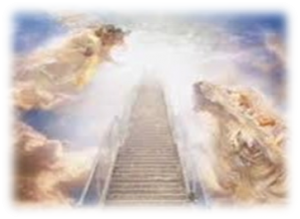LUKE 16: BRIDGING THE GAP
I’ve a close friend who somehow sensed that something may happen to him. When he died from septicaemia due to a hospital mistake, after a routing biopsy, his wife found a funeral service written out on a piece of paper and tucked away in his bible. She didn’t have to do anything for his funeral – all the planning was done for her, even down to who was going to speak, what bible passages to read, and what songs to sing!
 In a completely opposite approach, another friend knew he was going to die. He’d been diagnosed with a degenerative illness. However, even up to his last days, he wouldn’t discuss anything with his wife at all – not even about their finances or what to do with the house after he was gone. He left her with nothing discussed, planned for, or arranged. She had to work out everything alone.
In a completely opposite approach, another friend knew he was going to die. He’d been diagnosed with a degenerative illness. However, even up to his last days, he wouldn’t discuss anything with his wife at all – not even about their finances or what to do with the house after he was gone. He left her with nothing discussed, planned for, or arranged. She had to work out everything alone.
My two friends had two different approaches to their future and, stories like the ones in today’s chapter, are there to help us bridge the gap. So, this portion of the Book of Luke can be broken up into three parts: two stories and a bridge between the two.
At first glance, it seems difficult to imagine where Jesus is going with His story about the dishonest steward. [v1-15] It seems that He’s encouraging the use of treachery to “feather our own nest”. Making provision for our future through dishonest gains is, of course, not what we do.[v9] Jesus is simply highlighting the fact that the steward saw ahead, understood his future then, without delay, made provision ahead of time. Worldly tricksters are sharp thinkers, who do anything to ensure a good future.
How many of us understand what’s ahead of us, between life and death? Or, how easy it is to plan ahead because the gap has already been bridged for us? And how many will have people crying at our funerals, because of all the good things we’ve done with our time, energy and gifting?[a]
Whoever can be trusted with very little can also be trusted with much, and whoever is dishonest with very little will also be dishonest with much. So if we’ve not been trustworthy in handling worldly wealth, who in heaven will trust us with true riches? [v10-11]
The two stories are bridged with information that helps us understand what the Creator God is like. How can we live successfully as an “image-bearer”[b] – thinking, speaking and behaving in His likeness – unless we know what He’s like? For one thing, our Maker knows are heart. [v15] And, because of that, He knows (for example) that we can’t serve both God and money. [v13]
Today’s chapter, once again, shows that there’s no doubt that the Creator God is planning a future for His image-bearers – those who bear His image well, and live their lives in His likeness. The Law (how He would live if He were us) has been made known since ancient times and… “Since that time, the good news of the Kingdom of God is being preached, and everyone is forcing their way into it.” [v16]
 So then, within the context of using our position, connections, wealth, good fortune or blessings here, to have good relationships by helping others, Jesus tells another story. It’s about someone who deliberately ignored one of God’s image-bearers, who had been in great need, right under his nose. It would be difficult not to notice someone laying at your gate covered in sores. [v20] Even the dogs seemed to know how to sooth this man’s sores! [v21]
So then, within the context of using our position, connections, wealth, good fortune or blessings here, to have good relationships by helping others, Jesus tells another story. It’s about someone who deliberately ignored one of God’s image-bearers, who had been in great need, right under his nose. It would be difficult not to notice someone laying at your gate covered in sores. [v20] Even the dogs seemed to know how to sooth this man’s sores! [v21]
But even here, many people today can’t bridge the gap in their own minds, as to why an apparently good God would let bad things happen to good people. The story of Lazarus in today’s chapter, for example, is the perfect example of why many people turn their backs on the concept of a good God. Why on earth would a benevolent deity not help Lazarus in his painful existence on earth?! Well, there are four things you may not have spotted…
Since the earliest scenes in the Creator God’s epic storyline, it’s been clear that the human heart is flawed. From our Maker’s perspective, “every intent of the thoughts of the human heart seems only to be evil continually”.[c] So, short of staging another global flood, it’s a fact of life that the life experienced by humans is now hugely impacted in varying ways directly or indirectly by this ever-present brokenness.
So then, Jesus said: “It is inevitable (it a fact of life and no-one’s immune) that stumbling blocks (trouble, storms, temptations to sin) come, but woe to him through whom they come!”[d] Lazarus would have been tempted to hate his Maker, for the painful life he had to endure, but the blame seems to lay squarely at the door of the rich man who’s thoughtless and uncompassionate behaviour would certainly have caused Lazarus to sin by making him suffer without help!
Created in His image, the Creator God has given us a human conscience to act in His likeness[e] as He would act, and to help as He’d help. Because of this, Father God is incredibly cross with those who can be His ambassadors/representatives to this world, yet who don’t. Jesus said: “It would be better for him if a millstone were hung around his neck and he were thrown into the sea, than that he would cause one of these little ones (in this case, Lazarus) to stumble.”[f] Father God is watching out for the victims and will one day punish those who have been commissioned to help by being created in His likeness, but who’ll neither acknowledge His existence nor want to act like Him.
The bigger picture. Our time here is short compared to our eternity. Today’s chapter shows that the Creator God will bring eternal respite to the victims and, the full force His Law on the heads of those who exacerbate rather than alleviate suffering.
I expect that few of us would be so insensitive or uncompassionate as this rich man in today’s chapter. But what are we doing for the victims in this world? Am I going out of my way to find out what needs are out there? Whatever we do here on earth, whether it’s seen in our use of money, or in our relationships [v18], Jesus continually takes a holistic approach as He points us to the eternal picture. He teaches that life doesn’t stop with physical death. Our life here is only a chapter in a continuing story yet to come. Oddly enough, most people who have lost someone close to them, are hoping to see them again. We want a future with those we love. But we’re not discussing how to plan for that to happen!
 Yet from as far back as the days of Abraham, we’ve known that there’s two dimensions to life. Abraham, for example, entertained three “men”. They were clearly solid physical people, who could eat food. However, they later turned out to be “the Lord” and two angels.[g]
Yet from as far back as the days of Abraham, we’ve known that there’s two dimensions to life. Abraham, for example, entertained three “men”. They were clearly solid physical people, who could eat food. However, they later turned out to be “the Lord” and two angels.[g]
That story, in the first book of the Creator God’s epic storyline, has been recorded and made known for close on four millenniums. It’s always been “common knowledge”. However, Jesus’ teaching, in today’s chapter, tells us there’s two places where a human soul will go.
After our human body ceases to function, the dust returns to the ground it came from, and our spirit returns to God who gave it.[h] At this point, the Creator God will make a decision on what to do with the spirit of ME. The spirit He gave belongs to Him, and it will return to Him whether we believe in Him or not. In other words, all of us will “meet our Maker” after this life. But because His word in cast iron (and He never back-tracks on what he’s previously agreed to), it’s not a “recycled spirit”. It belongs uniquely to the person who received it. It’s a “life agreement” from our Maker that will not be revoked.
But now the Creator of the story has a problem.
Today’s chapter shows that the good place that He has planned for us, is very good. [v22] But the bad place – often described as a lake of fire – is very bad. [v23-24] So, in a very unique way, and for the first time in HIStory, Jesus spoke about both heaven and hell. The Book of Matthew Chapter 13, is a good example of Jesus explaining six times what heaven is like. No-one has ventured to explain heaven as frequently and clearly as Jesus did. And, no other world religion has spoken so clearly about hell except Jesus.
For our sake and for the sake of the victims in this life, the Creator God has already made an iron-clad agreement that nothing impure will ever enter into our eternal experience. Nor will anyone who does what is shameful or deceitful.[i] So, if He can’t allow evil to take root in His perfect Kingdom, to re-infect and corrupt Eternity, what can He do about the eternal side of our human being – that spirit He gave us?
While the Creator God bridges the gap between heaven and earth in a unique way that no other world religion has managed to duplicate, He also sets a chasm in Eternity between heaven and hell. Throughout His epic storyline, our Maker shows what we can expect and plan for. What’s important, is what we do here on earth. The display of “my natural instincts” – the real me – through my everyday choices, attitudes and behaviour, will directly effect my continuing story of ME. [v25]
If I live my life according to what Jesus taught, and the whole thing’s a myth, what have I lost? I’ve not lost anything. I will have lived a good life and will leave this life in the best way possible, with people at my funeral saying wonderful things about me.
However, if Jesus IS right and I’ve NOT believed Him, I’ll have Eternity to lose. I was neither wise, nor shrewd, in planning for my future. And that, unfortunately, is a gap set in time and space that’ll never be bridged.
CLICK to return to today’s “Daily Breadcrumbs”
[a] Acts 9:36-39
[b] Genesis 1:26-28a
[c] Genesis 6:5
[d] Luke 17:1
[e] Genesis 1:26-28a
[f] Luke 17:2
[g] Genesis c18
[h] Ecclesiastes 12:7
[i] Revelation 21:27